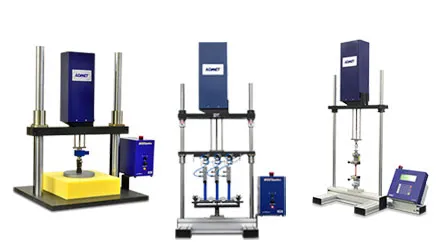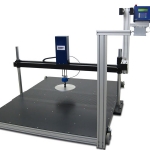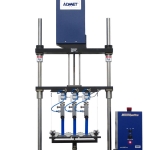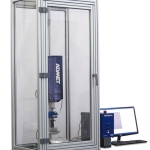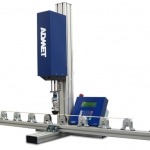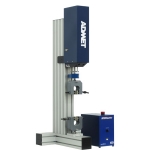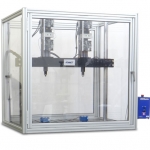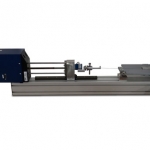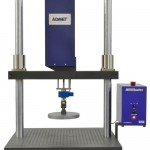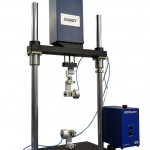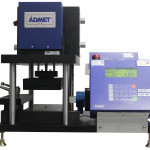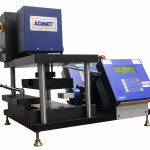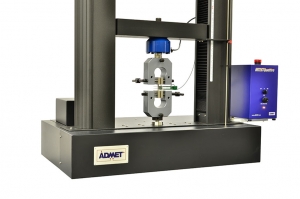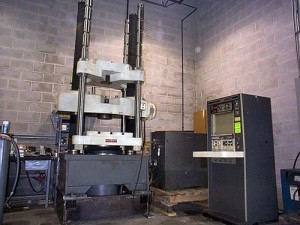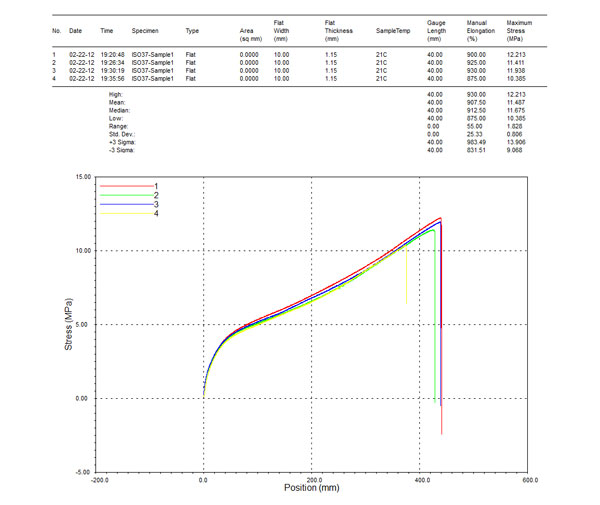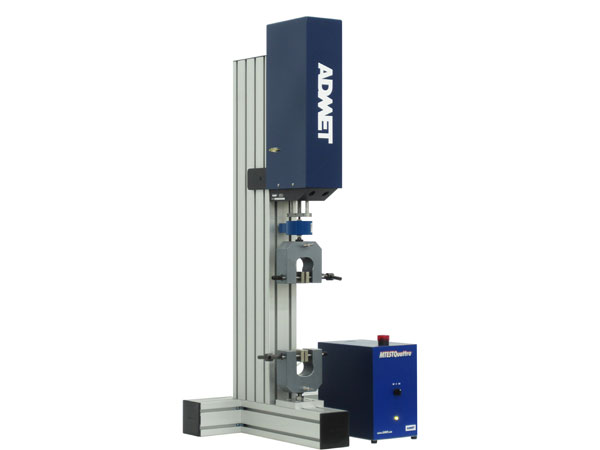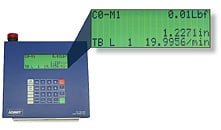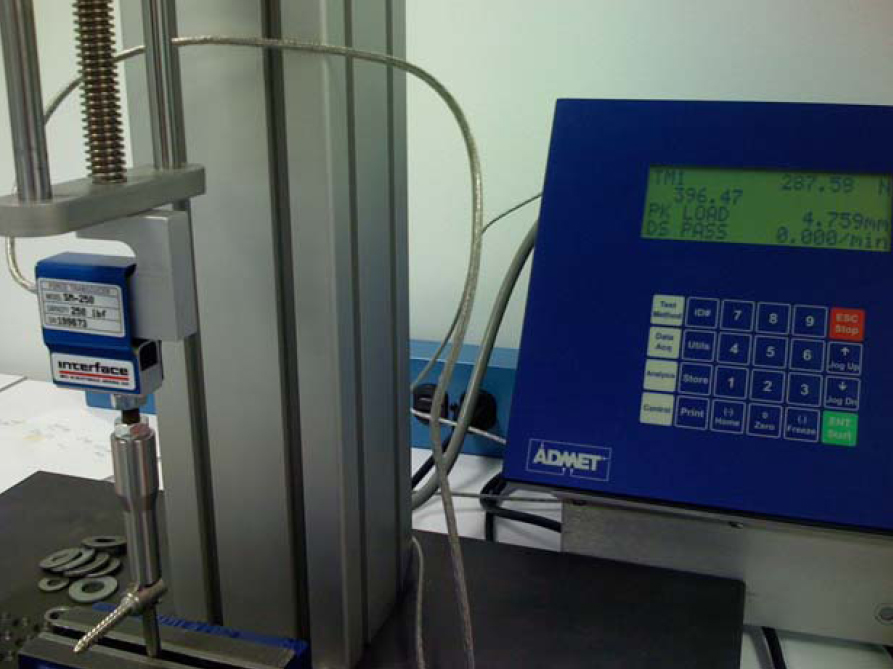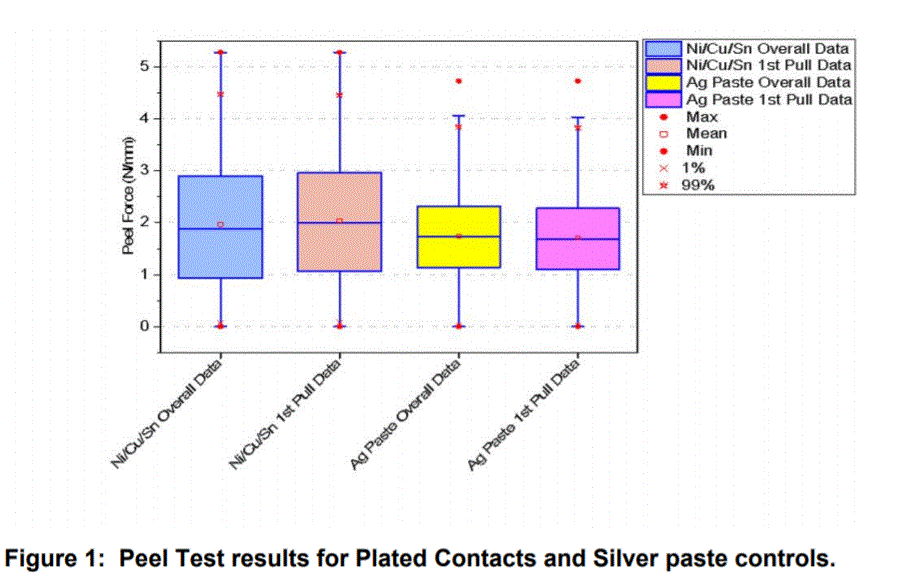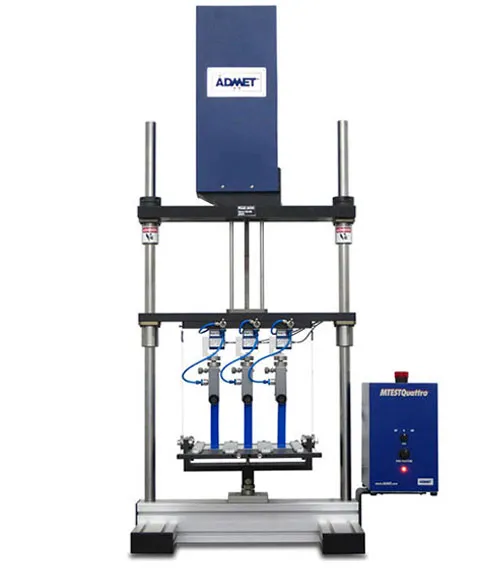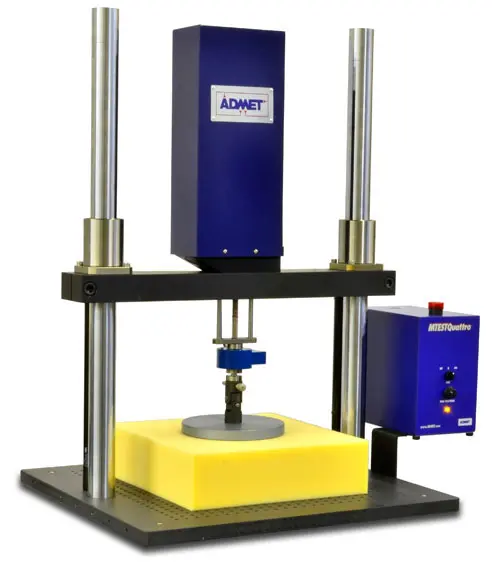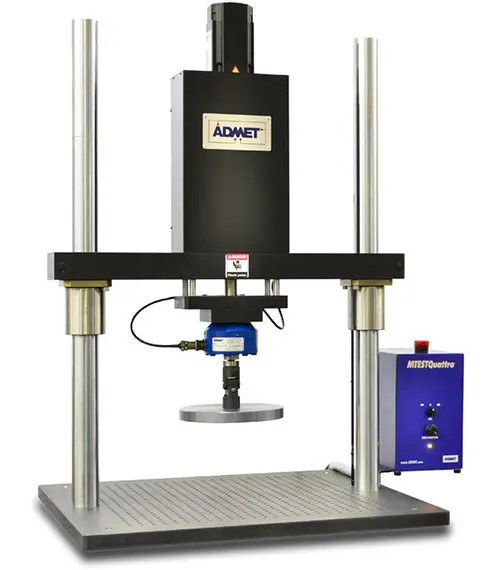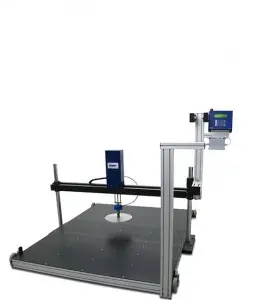eXpert 5000 | Configurable and Precise
The eXpert 5000 series testing machines feature modular single and dual column frame components, base plates and detachable actuators. This set up provides the ability to configure your system in a variety of vertical or horizontal orientations for a wide range of applications requiring flexibility and precise control. These systems are perfect for cost conscious users wanting to perform a variety of tests on a single machine. ADMET offers a full line of grips, fixtures, load cells, extensometers and heating and cooling systems.
- The Customer Experience: What to Expect from ADMET
- ADMET System Provided More Control for Biomedical Company
- A Simplification of IFD Foam Testing
- ADMET announces eXpert 5600F for Foam Testing
- ASTM D1708 Plastic Microtensile Testing Equipment
- ADMET introduces eXpert 5600F Series Foam Testing Machines
- Alaska Department of Fish and Game Tests Twine for Crab Pots using ADMET eXpert System
- X-Spine uses ADMET eXpert 5601 for development and quality testing
- University of Michigan Researchers use ADMET to test mechanical properties of bone
- McMaster University uses eXpert 5600 to test the flexural strength of bone
- Sandia National Laboratory runs tension, compression, and bend testing on an eXpert 5603 synchronized with Vic-3D DIC System
- Department of Energy uses eXpert 5600 UTM for 180 degree peel testing of solar cells with plated Ni/Cu/Sn front and Ag paste front grids
The Customer Experience: What to Expect from ADMET
Our Culture
The importance of customer service dominates the workplace culture at ADMET. Starting with the marketing department and the Account Directors on our sales team and moving through the engineering and technical support staff, customer service shines through. Our internal language and philosophy are centered around improving the life of our customers. Long before you become a customer of ADMET, you will experience a service mentality before hearing sales language.
A review of our marketing collateral reveals a focus on deliverables, improvements, applied technology and how customers will use our systems. Our web site is rich in videos because we believe that people learn more from seeing something in action instead of reading the manual. We try to take the perspective of our customers. We try to look down their end of the lens.
Plastic testing on an eXpert 2600
Our sales team doesn’t sound like a traditional sales team. Our Account Directors define themselves by the questions they ask, not by repeating features and benefits of our systems. We want to start a conversation with you. Our initial objective in sales is not to sell but to serve. Serve first, sell second. We diagnose your situation and therefore we gain insight into your needs. We help you prioritize those needs and we clarify if we can help. You are more likely to hear project management language from our sales team than sales moves! If we can help, we want to talk about configured solutions around your needs, and about operational dates including training.
And even if we can’t help because you require a testing laboratory not a manufacturer, or you require a system outside of our expertise, we will point you in the right direction. It’s just the right thing to do.
We Tailor Systems Based on Customers’ Needs
Our customer-centricity is best seen in our ability to configure systems to your needs. We manufacture a great family of products covering a plethora of applications but we find each case requires a specific configuration. Each potential customer has their own success criteria related to their industry, application and material. Each prospect does something their own specific way. For example, if a quality control team has already developed grips or is planning to build their own fixtures, we will accommodate by creating a machine that can incorporate these tools.
Because ADMET sales professionals and engineers are focused on service, they are trained to diagnose the requirements of customers and provide the solutions they need.
For example, the adhesives-focused Nerites Corporation came to ADMET to test the mechanical properties of tissue adhesives and sealants. We worked with this organization to meet their requirements, such as providing a fluid bath to test their materials in situ.
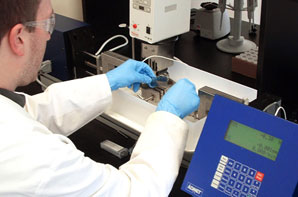
Even when prospects have an existing system we find ways to add improvements to their situation. We’ve been offering a retrofit service for more than 20 years to assist production managers who have an older materials testing machine. In these cases they may need to upgrade the system, especially since many national standards are updated and changed regularly. At ADMET, we provide a cost-effective service to install and retrofit a machine with fixtures, controllers, environmental chambers, extensometers, and other devices so that our customers do not have to purchase a whole new system.
Customer Support
After the sale, the key test of customer service kicks in. Can you reach a human being trained in your system who can quickly deal with your issue?
The customer support process begins the moment we receive your call or email. An ADMET employee will engage you in a dialogue about your needs and what you want to accomplish. After understanding your goals, we create and communicate a clear path of action to achieve success. This process of listening to you, the customer, and providing quick and timely deliverables is repeated until all your needs have been met and you are satisfied.
At ADMET, we believe that fast and effective customer support is essential to the customer experience. Whether you have lost your system documentation; require assistance with an ASTM or ISO standard, or have an in-depth technical question, the ADMET customer support team is here to assist and enhance your experience with our products.
We Serve Leading Organizations
Our list of customers available here speaks for itself. We have worked with leading universities, manufacturers, government agencies, biomedical companies, and testing laboratories around the world. This includes Carnegie Mellon University, Harvard University, MIT, Georgia Tech, NASA, General Electric, DuPont, John Deere, Boston Scientific, Johnson & Johnson, and Partners Healthcare.
Our customer-centric solutions are always accurate, flexible, and effective. The ADMET team also offers on-site training and installation. After system purchase, we guarantee a quick installation and training of new machinery. In addition, our customers can contact us by email or phone for other support services. Additional information on how to effectively use our material testing systems is available on our website.
Along with these services, our products are competitively priced because we believe in offering the best value based on top performance and functionality within the industry. We are focused on improving our customers’ performance and quality control procedures.
For instance, our software and controllers provide speedy, easy-to-access reports that display graphs and data analysis results based on the tests performed. These capabilities allow customers the flexibility to determine which tests and calculations are necessary for their quality control process.
MTESTQuattro Test Report for ASTM D412
An additional focus of our team is to deliver solutions with high accuracy so that our customers will be able to conduct extensive, repeatable tests according to ASTM and ISO testing standards. To learn more about our customer service or solve an issue with an ADMET material testing system, please contact our customer support team at support@admet.com or our sales representatives at sales@admet.com.
ADMET System Provided More Control for Biomedical Company
ADMET has recently helped one biomedical company meet its materials testing needs when the business sought to track the flexibility of its instruments. Karl Storz is a developer of meter-long endoscope tubing, which are devices used to study the inside of the human body. The company was in need of a testing machine that could conduct compression bend analysis and measure deflection rates on their endoscope tubing.
Single column eXpert 5600
The business considered creating its own materials testing machine, but later found that the solutions ADMET provides are more cost-effective and timely. In the end, Karl Storz purchased the eXpert 5601 1kN single column universal testing machine along with the eP2 Digital Controller and GaugeSafe Live Data Exchange Program.
In order to perform their compression bend tests, Karl Storz required a special bend fixture. ADMET engineers worked with Karl Storz on the design and provided it with the test system.
To ensure an efficient process for learning how to utilize the testing machine, an ADMET engineer arrived on-site to install the system and train the users. Once operational, the information provided by the eXpert 5601 tester allowed Karl Storz to gain greater control of their manufacturing process which helped them optimize their production line.
To learn more about how ADMET’s solutions helped Karl Storz, please read our case study here. Those in the biomedical sector can also benefit from our BioTense Bioreactor, which enables researchers to study cellular responses to physical forces. The system offers tissue engineers and scientists a way to conduct high-resolution investigation within mechanobiology. The bioreactor is fashioned on top of an XYZ stage of a microscope and administers uniaxial forces up to 7 Newtons.
In addition to the BioTense Bioreactor, ADMET supplies environmental chambers and fluid baths for researchers who wish to see how their biomaterials react in situ. To learn more about the materials testing machines and accessories that ADMET can offer, please call Vinny Milano, Account Director for the biomedical sector, at (781) 769-0850 x21.
A Simplification of IFD Foam Testing
Foam is both a versatile and crucial substance found in a wide variety of products including safety equipment, foam cushions in furniture, insulation & thermal protection, automobile interiors & sound deadening, carpet padding & flooring installations, shipping & packaging, shoes & apparel, mattresses & bedding, marine applications, and much more. It is hard to imagine our modern world without foam and foam products.
Materials testing systems are one option to consider when managing quality control of foam products. Foam testing is often concentrated on Indentation Force Deflection (IFD), a method for determining the firmness, stiffness, and load bearing capacity of the materials.
IFD measures the load required to depress a 50 square inch compression platen into a polyurethane foam specimen. These mechanical properties are influenced by the thickness and size of the sample. In essence, IFD measures firmness, which could be an essential part of chairs, couches and other furniture.
Before the existence of polyurethane foam, rubber latex foams were in wider use and the standard for measuring firmness was called RMA (Rubber Manufacturer’s Association), according to a publication from the Polyurethane Foam Association. RMA was executed in a similar way to IFD measurements of today.
While IFD plays a role in the comfort of a seat cushion, it is not the only factor, as tensile, tear, elongation, and recovery time tests are all part of the equation. This is represented as the number of pounds at a deflection percentage of the height of the specimen (ex. 40 lbs/50 square inches at a 30 percent deflection on a four inch thick sample).
Accuracy is a very important factor when measuring the Indentation Force Deflection. Manufacturers of foam and foam products come to ADMET in order to test their foam products because of our accurate and customizable systems as well as cost-effective results.
The eXpert 5600F foam testing system can perform IFD tests as well as tensile, compression, elongation, recovery time, and tear measurements. For those who need to determine the fatigue capabilities of their materials, the eXpert 5900F fatigue foam testing system can perform the same tests as the 5600F testing machine and can also conduct fatigue tests. These machines as well as ADMET’s software exceed international testing standards and can determine ASTM D3574 amd ISO 2439 among other foam testing specifications.
All types of foam can be tested on these particular ADMET machines including open-cell, closed-cell, latex, polyurethane, and reticulated. The eXpert 5600F series along with machine controllers and tension compression actuators fit a frame created specifically for testing foam specimens.
Some of the features of this machine include wide tensile grips for holding thicker foam samples, a circular indenter and swivel joint, the ability to quickly transfer between tensile and compression tests, and pre-installed foam test methods and analysis on the MTESTQuattro PC-based controller.
During an IFD test, the MTESTQuattro software charts live load and foam height over time. A report from the controller consists of the force of deflection, support factor, specimen identifier, load, and time. This controller offers flexibility with regard to control, data obtainment, analysis, and reporting.
ADMET staff developed the eXpert 5600F Series after working with leading companies within the foam industry and determining that typical universal testing machines do not adequately meet the needs of most foam manufacturers. These systems did not provide enough horizontal space for testing larger samples, were too large, and were prohibitively expensive.
The eXpert 5600F Series solved these problems through a design that was specific to foam specimens. This shows how the ADMET engineering team is capable of customizing and developing testing systems according to the specifications of its customers. ADMET materials testing machines are supported for life, exceed all ASTM and ISO testing requirements, and are easy to install and use. To learn more about our foam testing machines, please contact Andrew DeWolfe, the Account Director for the foam sector, at 781-769-0850 ext. 29.
ADMET announces eXpert 5600F for Foam Testing
ADMET is proud to announce the release of the eXpert 5600F Foam Testing machine. This testing machine has been specifically configured to meet the needs of the foam testing industry. Having worked with many manufacturers in the foam industry, we found that traditional universal testing machines are not ideal solutions to foam testing machines. Given the large size of most foam samples being tested, manufacturers needing to test foam were often forced to buy a larger machine with much higher force capacity than what is needed. This would result in a significantly higher cost.
The eXpert 5600F solves this problem by combining a unique frame specifically designed for foam samples with ADMET’s proven tension and compression actuators and machine controllers.
Features:
- 20” x 20” or 24″ x 24″ perforated lower base platen
- Tensile grips wide enough for thick foams
- Change between tensile and compression tests quickly
- Upper platen with swivel joint for non-level foam
- Preloaded foam test methods and analysis (MTESTQuattro)
Watch the video below to see the 5600F in action:
To learn more about the eXpert 5600F and other products and services we offer, submit a Sales Inquiry or call us directly at (800) 667-3220
ASTM D1708 Plastic Microtensile Testing Equipment
Check out our latest page on ASTM D1708 here
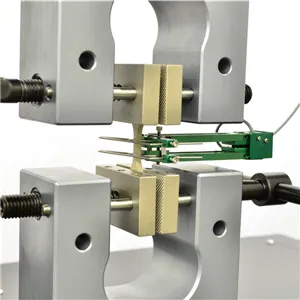
Grips and extensometer for ASTM D1708 microtensile testing
Summary:
Historically, test method ASTM D1708 has been used to measure the tensile and elongation properties of plastics that have little amount of material available. There are also many other ASTM test methods for specific materials (FEP, ETFE, PTFE) that reference the same test method a list of which is referenced below. A change has been made to the ASTM D1708 tensile specimen shape so that it now is the same as the shape found in ISO 12086-2. ASTM D1708 is no longer the preferred plastic microtensile method as ASTM recommends the much more common ASTM D638 tensile test using the very small type V specimen shape. If interested, another ADMET page discusses ASTM D638 here.
The convenient feature of D1708 is that the specimen shape is such that an extensometer is not required to perform the test. Rather, the universal testing machine’s built in jaw separation position is sufficient to measure elongation. It becomes critical however that you have a very accurate initial jaw separation which happens to be less than an inch.
Equipment Required:
- Universal Testing Machine (UTM) of the constant-rate-of-crosshead-movement variety. I’m not aware of any manufacturer that makes anything but this type anymore. However, the UTM should be servo-controlled to maintain the set speed throughout the test.
- Load Cell accurate to at least 1% of the reading. Also, the breaking strength of the material should be between 1/100th and the full capacity of the load cell. For example, a 100 lbf load cell should be used to measure from 1 – 100 lbf.
- Tensile Grips of the “vise” or “side action” variety so as not to interfere with the elongation measurement. Serrated, plain, and rubber coated jaw faces can be used. Pneumatic grips of the “side action” type can also be used. Self-tightening grips such as eccentric roller and wedge styles are not good for this test. Eccentric roller grips are hard to set the jaw separation properly and wedge grips have the same problem but can also add an undesirable compressive load on the sample. Systems that adjust grip separation automatically to accommodate a compressive load then adjust the gauge length. It’s not tricky as it sounds if you use a simple pair of manual tensile vise grips.
The cost for a system that meets the accuracy requirements of the specification and include all the items above generally start at around $ 8,000 USD. Depending on vendor and options chosen, typical 1kN – 50 kN systems range in price from $8,000 – $ 40,000 USD. The major cost driver with these systems is the maximum force capacity of the system. 1 kN & 5 kN single column systems are sufficient for many materials when testing to a microtensile method and are the most cost effective. Larger capacity 10, 25, 50, 100 kN and higher dual column systems are also available that can perform this test as well and performing other high capacity tests.
Other Microtensile Test Methods:
- ASTM D2166 Section 11.4 – Tensile Properties of FEP Fluorocarbon Molding and Extrusion Materials
- ASTM D3159 Section 11.4 – Tensile Properties of Modified ETFE-Fluoropolymer Molding and Extrusion Materials
- ASTM D4745 Section 12.4 – Tensile Properies of Filled Compounds of Polytetrafluoroethylene (PTFE) Molding and Extrusion Materials
- ASTM D4894 Section 10.7 – Tensile Properties of Polytetrafluoroethylene (PTFE) Granular Molding and Ram Extrusion Materials
- ASTM D4895 Section 10.7 – Tensile Properties of Polytetrafluoroethylene (PTFE) Resin Produced From Dispersion
Video of a Micro tensile test:
ADMET Introduces eXpert 5600F Series Foam Testing Machines
In our years of experience working with leaders in the foam industry, it has become clear that traditional universal testing machines are not flexible enough to be an all-in-one solution for foam testing. Engineered to satisfy the specific requirements of the foam testing industry, the ADMET eXpert 5600F series combines our proven 5600 series actuators with a wide-base frame designed specifically compressing large foam samples.
5600F series machines can quickly switch to a tension testing configuration, allowing you to perform tension and compression tests on virtually all types of foam samples on one system. Systems equipped with MTESTQuattro, our most advanced pc-based testing controller, feature built-in test procedures and analysis calculations for popular testing standards such as ASTM D3574.
For more information, please visit our foam testing page or contact ADMET via phone, email, or online form.
Alaska Department of Fish and Game Tests Twine for Crab Pots Using ADMET eXpert System
The Alaska Department of Fish and Game (ADF&G) has broad responsibilities including oversight of the crab fisheries in Alaskan waters. A consequence of the pot gear used by the industry is a phenomenon called “ghost fishing,” which happens when functional pots are lost but continue to trap and kill crabs and other organisms. In response, regulations were enacted that require one sidewall of all crab pots have an opening that is secured with a biodegradable 100% cotton twine that would break down over time, fail and allow the trapped organisms to escape.
The twine, which is expected to secure the pots for approximately 30 days, degrades over time due to biological activity that breaks down the cellulose in the twine. At the end of 30 days, the twine should degrade to the point that it fails so the crabs and other organisms can escape. “Soak time” is the primary determinant of twine failure.
The ADF&G staff determined that tensile testing the twine under controlled conditions would provide necessary empirical data. The study will measure how quickly the twine loses tensile strength and/or elasticity with increased soak times.
The ADF&G staff considered field-testing twine using actual crab pots, but it would have required a large vessel, been labor intensive, and expensive. Ultimately, they decided to use a controlled study and eliminate as many variables as possible.
David Barnard, the Biometrician for the program, prepared a project proposal and then researched universal testing machine providers. ADMET offered the lowest price and was able to satisfy all of ADF&G’s requirements with a simple and easy to use system.
Barnard ordered an eXpert 5601 tabletop machine equipped with an eP2 Digital Controller, a standalone touch panel controller that offers a balance between performance and simplicity, GaugeSafe data exchange software and a set of grips.

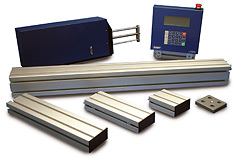
X-Spine Uses ADMET eXpert 5601 for development and quality testing
An FDA registered and ISO 13485 compliant organization, X-spine performs biomechanical testing of all of its components to ASTM F1717 and/or F1798 standards. Explained David Kirschman, X-spine President, “We conduct biomechanical testing for both quality control and product development, looking for peak load, yield, yield load, percent of elongation and elasticity.”
Initially, X-spine outsourced all of its biomechanical testing. As production ramped up, however, it was cumbersome and inefficient to rely on outside services, especially for ad hoc testing. Kirschman decided to bring some testing in-house.
After determining that electromechanical screw based machines were appropriate for his needs, he looked at a number of different brands online. He selected the ADMET eXpert 5601 tabletop machine with an eP2 Digital Controller, a standalone touch panel controller that offers a balance between performance and simplicity, a 1.1kN load cell and GaugeSafe Data Exchange software.
The setup is simple and quick, and it is readily available for the ad hoc testing that Kirschman was looking for. “The nice thing about the ADMET is it’s a very simple machine with the computer/controller built in. So, a quality control inspector can come in and operate it efficiently and easily to run an individual part for a static test.”
University of Michigan researchers use ADMET to test mechanical properties of bone
A University of Michigan research laboratory is conducting mechanical testing of bone to measure its mechanical properties. Led by Prof. David Kohn, the lab conducts destructive tests that flex the bone to failure in a four-point bend fixture. Their research calls for a system that can accurately control the deflection rate, and generate a flexural stress versus strain curve. Another test results in a cyclic control profile in which the specimen is cycled between two defined values at a frequency of one Hertz for two hours.
Prior to finding ADMET, the lab used an in-house-built testing machine for flexural testing, but this could not meet requirements for repeatable and accurate deflection rate control.
To provide precise, repeatable flexure and break tests, the lab selected an ADMET eXpert 5600 series low-force universal materials testing machine equipped with MTESTQuattro, a PC-based controller that offers a wide range of flexibility in control, data acquisition, analysis, and reporting.
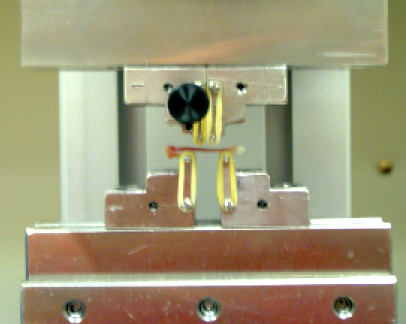
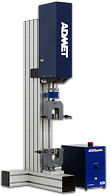
McMaster University uses eXpert 5600 to test the flexural strength of bone
The Department of Mechanical Engineering at McMaster University of Hamilton, Ontario recently began conducting biomechanical research. The projects, under the direction of Assistant Professor Greg Wohl, PhD, studies the effects of mechanical loading on bone through compression and flexure testing. The University had not conducted this type of research and, although well-equipped for mechanical testing, some new equipment was required.
The study looks at the structural and material properties of bone and includes the effects of diet, nutraceuticals, osteoporosis and aging. “We’re looking at preventative measures for bone-related disorders and/or therapies for treatment of bone-related disorders. We know that mechanical loading triggers new bone formation. However, what causes the bone formation to occur and how to maintain bone mass differ and are not as immediately apparent. So, we’re starting to look at gene expression, and what the cells does when they’re loaded,” said Wohl.
The research required a universal testing machine to perform bend and cyclical flexure tests. The tests had to be tightly monitored and controlled in order to stress specimens to pre-determined levels. The lab had an older Instron that required a new load cell, as well as likely electrical upgrades.
After contacting ADMET, Wohl discovered that he could purchase a new eXpert 5601 tabletop system an eP2 Digital Controller and the required load cell for approximately US$6,500 – about US$1,500 more than a new Instron load cell.
He and his graduate assistant were able to develop profiles under which they could conduct bend and cyclic flexure tests to predetermined percentages of failure and record deformation over hundreds or thousands of cycles. Wohl sees additional applications for ADMET systems. A new project will require that he conduct pull-out tests of screws for spinal reconstruction and Orthopaedic applications.
Researchers at Sandia National Laboratory investigated the fracture resistance of a simulant polymer bonded explosive (PBX) through the design of a new multiaxial testing method using three dimensional (3D) digital image correlation (DIC).
Mechanical testing was conducted using an ADMET expert 5603 Table-Top universal test system equipped with a 4.5kN load cell and the MTESTQuattro controller. During the test, the specimen is mounted in a three-point bend fixture and subjected to compression as illustrated according to the AASHTO TP 105-13 standard. Teflon tape and lubricate is applied to the compression platens to minimize friction. The distance between the support anvils, L is 23.4mm. The diameter of the load and support anvils is 5 mm. An initial seating load of 80 N is imposed on the specimen. The SCB tests are executed under displacement control at a rate of 0.5 mm/min. Fracture energy, work of fracture, fracture toughness, and other mechanical properties are calculated and, amongst other properties, the stress-strain response of PBX simulant is studied.
To date, there have been several key findings that point to plated contacts performing equal to or better than the current state of the art silver paste contacts. The goal of this project is to provide a commercially viable Ag-free metallization technology that will both reduce cost and increase efficiency of standard silicon solar cells.
Peel testing was performed on both silver paste controls and plated solar cells in order to generate confidence in the test procedure. Ribbon similar to what is used in industry is first hand soldered onto the busbars. A 180 pull angle is used with a pulling speed of 200 mm/min using the ADMET eXpert 5600 Series Universal Testing System. This force tester gage has a load limit of 2.2 lbf (9.786 N) ~ 4.893 N/mm. The samples are secured to a vacuum plate for peel testing and the force required to pull the ribbon away from the cell is measured. The adhesion strength is the force per unit width of the ribbon. Quantitative peel testing was performed on 10 cells with plated Ni/Cu/Sn front grid (27 bus bars) and 5 cells with Ag paste front grid (15 bus bars).
Both plated cells and Ag paste cells demonstrate passing average adhesion strength of >1.2 N/mm: Average for 10 plated cells (27 bus bars) = 2.0 ± 1.2 N/mm Average for 5 Ag paste cells (15 bus bars) = 1.7 ± 0.9 N/mm Figure 1 shows the high level quantitative results of this experiment. There is a tester limitation ~ 5 N/mm at which the pull tester abruptly stops. To continue testing, the sample was adjusted and the tester restarted. The overall data in Figure 1 refers to the measurements including the tool stopping & being restarted. The 1st pull data is only measurements until the tool stops. The data between the overall & 1st pull is fairly similar but included for completeness.
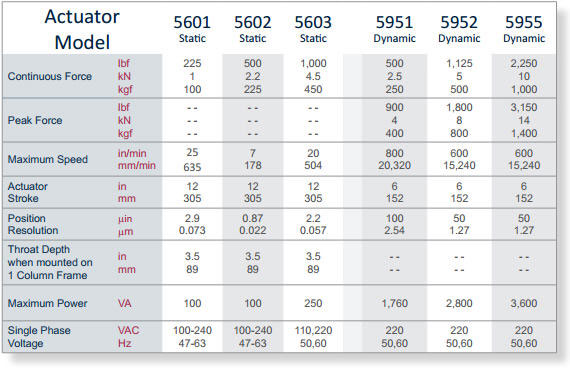
eXpert 5000 Specification Chart
Featured Configurations
eXpert 5952F Dynamic Foam Testing System
ADMET’s eXpert 5952F testing system is designed to perform tensile and compression tests at both standard and high speeds.

